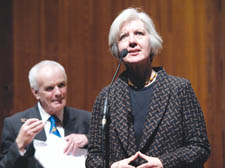|
|
 |
| |
| |
 Judith Weir onstage at the Barbican Hall with Peter Maxwell Davies Judith Weir onstage at the Barbican Hall with Peter Maxwell Davies |
Lively celebration of Weir and the Barbican's history
REVIEW: JUDITH WEIR:
TELLING THE TALE - CONCRETE
Barbican
THE annual BBC Symphony Orchestra’s January Composer’s Weekend came to a close on Sunday evening, marking the end of a four-day celebration of the music of Judith Weir.
Weir’s works, both choral and orchestral, frequently act as an expression of her interest in the evocative powers of narrative, theatre and, specifically, folklore.
All of these elements were present in the two works performed in the Barbican on Sunday – Moon and Star (1995) and the world premiere of CONCRETE, commissioned by the BBC for the Composer Weekend.
Weir’s tastes were also evident in the choice of Michael Finnissy’s Red Earth to act as a segue for her works.
Moon and Star, which takes its inspiration from the Emily Dickinson poem of the same name, has a light, magical and effervescent quality.
Forever hinting at a full-throated choral melody, the swell of the orchestra is kept in check by Weir’s refusal to embrace music that is overtly straightforward or “easy”.
The result is a challenging piece, more akin to listening to snippets of a movie soundtrack than to the kind of works usually performed live.
Though you might be transported by the music, wrapped up in the intense mental imagery written into every line of it, you are never invited to fully engage in its melody.
If Weir’s Moon and Star hints at the lighter side of movie melody, Michael Finnissy’s Red Earth is all art-house in its cinematic darkness.
Inspired by the composer’s plane trip across the desert lands of Australia, Red Earth is a relentless and stubborn piece of music that evokes a ritualistic setting without slipping into clichéd rhythms or melodic patterns.
If anything, Red Earth actively avoids anything resembling conventional structure, opening with the wailing lament of trumpets, gradually building in intensity as brass and bass blast out in unison, but collapsing in on itself without warning, as whole sections of the orchestra are stopped dead, suddenly, fracturing the melody and creating an air of musical and ideological discordance.
This is not music you’ll find yourself humming in the shower the day after you hear it, but this should not be mistaken for criticism.
Weir’s music, and Finnissy’s too, is always challenging, always engaging, and the fact that the music misbehaves – in the conventional sense of what one expects from melody – only goes to make it all the more interesting for any listener willing to forget preconceptions about orchestral and choral works.
That the performance of such strange, minimalist and at times absurdly difficult music did not gradually disintegrate into something sonically resembling an orchestra heard tuning up from the far side of the M4 is, of course, as much a credit to conductor Martin Brabbins as it is to the orchestra and the symphony chorus.
They each came into their own in the third and final piece of the evening, CONCRETE.
A musical pastiche drawing on sources as varied as John Evelyn’s diaries, Shakespeare’s sonnets and the prospectus for the redevelopment of the Barbican, CONCRETE is, in Weir’s own words, “an imaginary excavation of the Barbican centre, burrowing through 2,500 years of historical rubble”.
Just as concrete takes elements of what has existed and blends them to create something new, Weir binds together fragments of London’s history and shapes to create her new work.
The result is an evocative piece, with the great fire of London as a central image in an exploration of the cycle of destruction and rebirth.
The use of a narrator (Samuel West) heightens the intensity of the experience, though the tone of the delivery borrows a little too heavily from Jeff Wayne’s War of the Worlds to be considered truly original.
And therein lies the only criticism of CONCRETE, which, when taken as a whole, is a thoroughly enjoyable piece. The problem comes from the fact that a pastiche, by definition, should create something that feels at once recognisable but also unarguably new.
The dominance of Weir’s chosen source material leaves the question of whether the music would stand up without such borrowed, albeit powerful, elements in “supporting roles”.
But this is just a small quibble, and when looked at in the context of the whole weekend – and Sunday’s performance in particular – it is a quibble that can easily be excused.
|
 |
|
 |
|
|
 |
|
 Judith Weir onstage at the Barbican Hall with Peter Maxwell Davies
Judith Weir onstage at the Barbican Hall with Peter Maxwell Davies 






